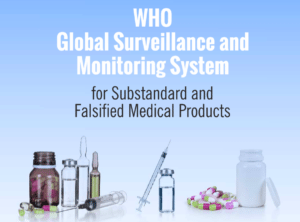From Street Markets to Websites: Counterfeit Drugs Infect The Whole World

Source: World Health Organization Report
As reported by WBUR, the World Health Organization (WHO) recently released a report that estimates that “1 in 10 medical products circulating in low- and middle-income countries is either substandard or falsified.” One hundred peer-reviewed surveys on medicine quality from 88 countries beginning in 2007 through 2016 were analyzed to come up with the data. Substandard and counterfeit medicines reported included a wide variety of pharmaceuticals including vaccines, antibiotics, antimalarials, birth control pills, cough syrup, and diagnostic supplies.
PSM Board Member Kenneth “Mac” McCall stated that “A 10.5 percent failure rate on medical products is unacceptable anywhere in the world. And that threat is growing, not diminishing, because it is a huge underground industry, a very profitable criminal industry that is even threatening our secure drug supply chain in the United States.” McCall pointed out the direct link counterfeit medicines have in the U.S. to the opioid crisis elucidated by PSM’s publication 40 States and Counting: The Deadly Combination of Imported Fentanyl and Counterfeit Medicines, “We know that it’s contributing to the opioid crisis in the United States.”
Since WHO created the Global Surveillance and Monitoring System for substandard and counterfeit medicines in 2013, they have received 1,500 reports. While 42 percent of the reports came from WHO African Region, WHO Region of the Americas and WHO European Region each accounted for another 21 percent of the reports. Suzanne Hill, who directs WHO’s Department of Essential Medicines and Health Products said, “We have reports from all over the globe, countries rich and poor, and reports on all types of products, both innovative or generic, expensive or not.”
Michael Deats, an expert on medicine and safety with WHO said, “If there is insufficient product on the market, within days, the vacuum is filled with falsified versions.” Deats also said that location does not matter. “It’s about just as risky to buy medications from a street market in Africa as it is to buy them from an unregulated website in North America.” The complete WHO report is available to view or download here.